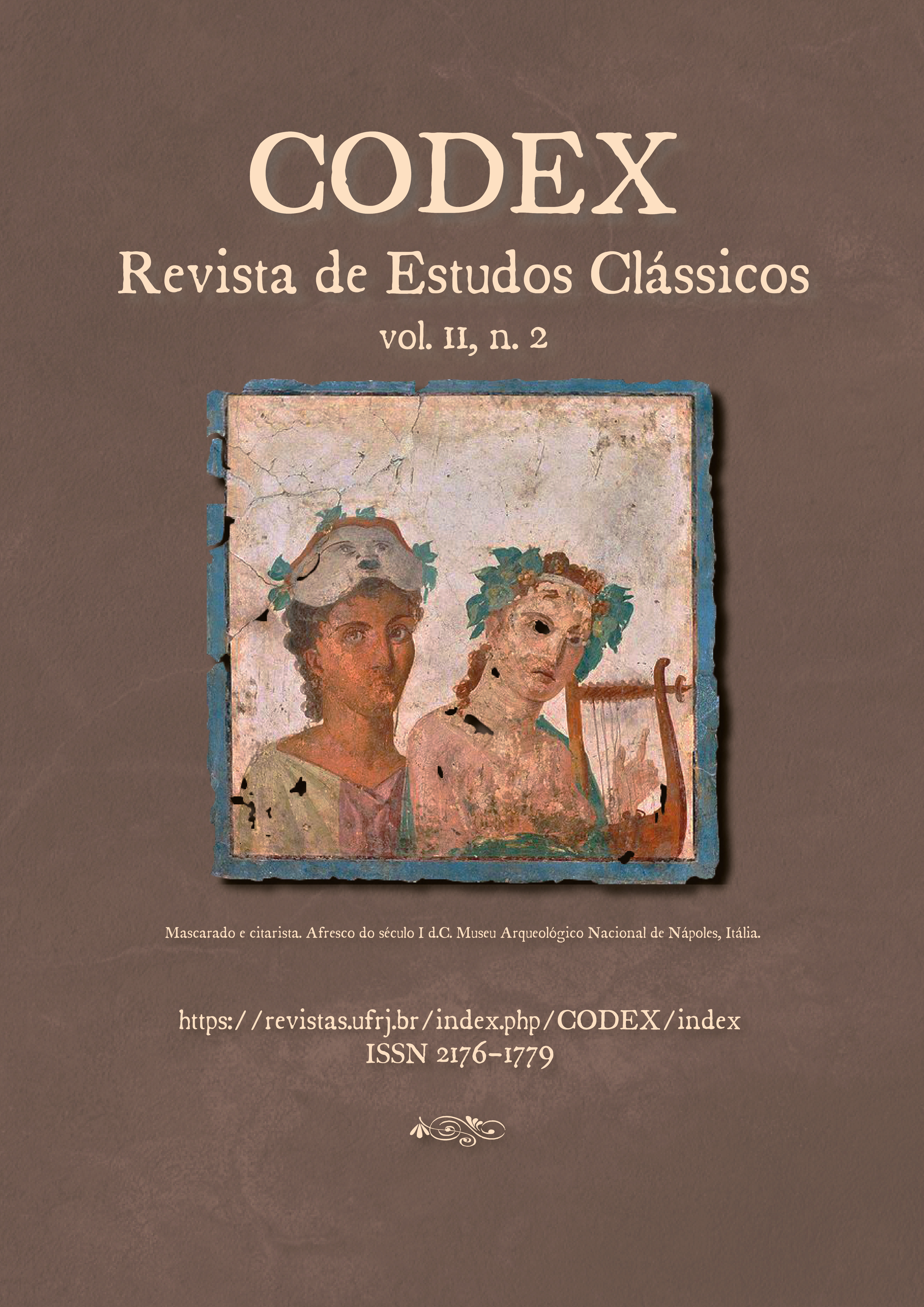Ambivalences of the logos
A reading of Sophocles’ Antigone
DOI:
https://doi.org/10.25187/codex.v11i2.59153Keywords:
Ancient tragedy, Sophocles, Antigone, Creon, Gender studiesAbstract
The tragedy Antigone by Sophocles is usually read in Modernity through a contrast between values and perspectives defended by the homonymous character and those favored by her uncle and ruler of Thebes, Creon: oikos [family] / polis [city]; female / male; religion / politics; unwritten laws / written laws; etc. Some contemporary readings even propose a positive understanding of Antigone’s attitudes, as opposed to those assumed by Creon (characterized as negative). In this paper, I advance an interpretation that is based on a philological reading of the play — also informed by anthropological studies attentive to gender issues and certain sociocultural practices — in order to problematize this type of simplified dichotomous treatment. I intend to indicate that there are some elements of Antigone in Creon and vice versa, arguing in favor of a more attentive understanding of the nuances in the presentation of these characters, as well as in Sophocles’ tragic reflection: what is at stake here is not a simple solution to the dilemmas of existence, but a problematization of the human condition, divided between family and city, female and male, religious and political commitments, striving to exist.
Downloads
References
CARTER, David. Antigone. In: MARKANTONATOS, Andreas (ed.). Brill’s Companion to Sophocles. Leiden; Boston: Brill, 2012, p. 111-28.
FOLEY, Helene. Tragedy and Democratic Ideology: The Case of Sophocles’ Antigone. In: GOFF, Barbara (ed.). History, Tragedy, Theory: Dialogues on Athenian Drama. Austin: University of Texas Press, p. 131-50.
GOLDHILL, Simon. The Great Dionysia and Civic Ideology. The Journal of Hellenic Studies, v. 107 (1987), p. 58-76.
GOLDHILL, Simon. Reading Greek Tragedy. Cambridge: Cambridge University Press, 1986.
HESTER, D. A. Sophocles the Unphilosophical: A Study in the Antigone. Mnemosyne, Vol. 24, Fasc. 1, 1971, p. 11-59.
JAEGER, Werner. Paideia: A Formação do Homem Grego. Trad. Artur M. Parreira. São Paulo: WMF Martins Fontes, 2013.
KNOX, Bernard M. W. Édipo em Tebas: O herói trágico de Sófocles e seu tempo. Trad. Margarida Goldsztyn. São Paulo: Editora Perspectiva, 2002.
KNOX, Bernard M. W. The Heroic Temper: Studies in Sophoclean Tragedy. Berkeley; Los Angeles; London: University of California Press, 1983.
LARDINOIS, André. Antigone. In: ORMAND, Kirk (ed.). A Companion to Sophocles. Malden; Oxford; Chichester: Wiley-Blackwell, 2012, p. 55-68.
LESKY, Albin. A tragédia grega. Trad. J. Guinsburg, Geraldo Gerson de Souza e Alberto Guzik São Paulo: Editora Perspectiva, 2010 [1938].
LEWIS, R. G. An Alternative Date for Sophocles’ Antigone. Greek, Roman and Byzantine Studies, vol. 29, n. 1 (1988), p. 35-50.
LORAUX, Nicole. L’Invention d’Athènes : Histoire de l’oraison funèbre dans la « cité classique ». Paris : Édition de l’EHESS, 1981.
LORAUX, Nicole. La voix endeuillée: Essai sur la tragédie grecque. Paris : Gallimard, 1999.
McCOSKEY, Denise Eileen; CORBETT, Mary Jean. Virginia Woolf, Richard Jebb, and Sophocles’ Antigone. In: ORMAND, Kirk (ed.). A Companion to Sophocles. Malden; Oxford; Chichester: Wiley-Blackwell, 2012, p. 462-76.
McHARDY, Fiona. Women’s influence on revenge in ancient Greece. In: McHARDY, Fiona; MARSHALL, Eireann (eds.). Women’s Influence on Classical Civilization. London; New York: Routledge, 2004, p. 92-114.
NUSSBAUM, Martha. The Fragility of Goodness: Luck and Ethics in Greek Tragedy and Philosophy. Revised Ed. Cambridge: Cambridge University Press, 2001.
RABINOWITZ, Nancy Sorkin. Politics of inclusion/exclusion in Attic tragedy. In: McHARDY, Fiona; MARSHALL, Eireann (eds.). Women’s Influence on Classical Civilization. London; New York: Routledge, 2004, p. 40-55.
RINGER, Mark. Electra and the Empty Urn: Metatheater and Role Playing in Sophocles. Chapel Hill; London: The University of North Carolina Press, 1998.
SEAFORD, Richard. Reciprocity and Ritual: Homer and Tragedy in the Developing City-State. Oxford: Clarendon Press, 1994.
SILVA, Maria de Fátima. Antigone. In: LAURIOLA, Rosanna; DEMETRIOU, Kyriakos N. (eds.). Brill’s Companion to the Reception of Sophocles. Leiden; Boston: Brill, 2017, p. 391-474.
SOURVINOU-INWOOD, Christiane. Assumptions and the creation of meaning: Reading Sophocles’ Antigone. Journal of Hellenic Studies, vol. 99, 1989, p. 134-48.
VERNANT, Jean-Pierre. Tensões e ambiguidades na tragédia grega. In: VERNANT, Jean-Pierre; VIDAL-NAQUET, Pierre. Mito e tragédia na Grécia antiga. 2 ed. São Paulo: Perspectiva, 2011, p. 7-24.
VIDAL-NAQUET, Pierre. Édipo em Atenas. In: VERNANT, Jean-Pierre; VIDAL-NAQUET, Pierre. Mito e tragédia na Grécia antiga. 2 ed. São Paulo: Perspectiva, 2011, p. 267-86.
WISE, Jennifer. Dionysus writes. Ithaca and London: Cornell University Press, 1998.
ZEITLIN, Froma I. Playing the Other: Theater, Theatricality, and the Feminine in Greek Drama. In: WINKLER, John J.; ZEITLIN, Froma I. (eds.). Nothing to Do with Dionysos? Athenian Drama in Its Social Context. Princeton: Princeton University Press, 1990a, p. 63-96.
ZEITLIN, Froma I. Thebes: Theater of Self and Society in Athenian Drama. In: WINKLER, John J.; ZEITLIN, Froma I. (eds.). Nothing to Do with Dionysos? Athenian Drama in Its Social Context. Princeton: Princeton University Press, 1990b, p. 131-67.
Downloads
Published
How to Cite
Issue
Section
License
Copyright (c) 2024 Rafael Guimarães Tavares da Silva

This work is licensed under a Creative Commons Attribution-NonCommercial 4.0 International License.
This work is licensed under a Creative Commons Attribution-NonCommercial 4.0 International License.










